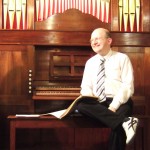Hastings Unitarian August 11 2012
Despite the sudden appearance of rarely-seen sunshine in this unreliable summer, the audience almost completely filled the Unitarian Church for an hour’s entertaining revelation of the intricacies of the recently refurbished 1770 Snetzler organ. This shining instrument and the expertise of Stephen Page combined in a musical journey from the sixteenth century to present day.
With Stephen’s concise and oft times witty introductions to each piece, the afternoon passed in a whirl of sound, beginning with a Fanfare and Festival March in sparkling style by Herbert Wareing, with an example of a sixteenth century dance rhythm to follow.
The father of the Bach dynasty Johann Sebastian was represented by a chorale prelude and a ‘miniature’ of a chorale prelude and fugue. A set of five variations on a theme by the prolific Dutch composer of the Elizabethan era Jan Sweetlinck was indicative of the extended research Stephen devotes to these programmes.
From two centuries later came works by Brahms and Handel, coming up-to-date with variations on the theme of Rule Britannia by Latour including a hornpipe and a gavotte.
A film theme Gabriel’s Oboe led into a charmngly light-hearted piece by the celebrated one-time organist of Liverpool Cathedral, Noel Rawsthorne, Dance of the Butterflies, the programme closing with a march Dignity and Impudence by the Bournemouth-born composer Percy Whitlock, whose music is currently receiving a well-deserved resurgence of interest.
The third in this series of programmes tracing the development of music written specially for or being adapted for the organ is on Saturday October 13 at 2.30 p.m. when again Stephen will delve into the musical archives to produce something with which to intrigue and entertain us. MW

